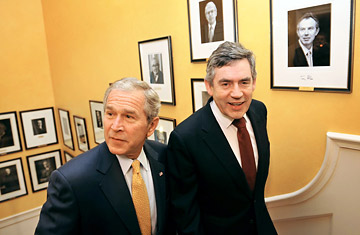
British Prime Minister Gordon Brown (R) walks with U.S. President George W. Bush inside 10 Downing Street in London, England
When George Bush and Gordon Brown held their first joint press conference last summer, there seemed to be little chemistry between the two leaders. How times have changed. A visit to London and Belfast by the President on June 15-16, the finale of his week-long European tour, showed just how much common ground he shares with the British Prime Minister.
Both politicians see Afghanistan as a foreign policy priority (Brown announced more troops for the region during Bush's visit); they're both looking to reduce troop numbers in Iraq but only in consultation with their military commanders on the ground; they both hope tougher sanctions will pull Iran to heel. But the similarities go deeper than that. At their first meeting last July, Bush already appeared to be a spent force, an unpopular President eking out his final days of power. Brown, by contrast, was buoyed by an early wave of public support after taking over from Tony Blair. Now Brown faces plunging poll ratings and speculation in Westminster about ouster plots. Bush is asserting himself with renewed vigor at home and abroad, but intense interest in the race for the White House provides a daily reminder that his time at the top is nearly over. There's nothing like the prospect of leaving office to make similarly fated politicians focus on their legacy.
"We both share a great love of history," said Brown at their London press conference. History is the judge the two leaders are relying on to decide in their favor at some indeterminate future date. They may have picked up a few good tips from the clutch of eminent British historians — David Cannadine, Martin Gilbert, Andrew Roberts and Simon Schama — whom Brown invited to Downing Street to join the President and First Lady for a hearty dinner of pea soup and roast beef. Another guest at the dinner, Rupert Murdoch, could also have offered sage advice. He presides over a media empire that has burnished some reputations and savaged others.
A handful of London demonstrators brandished the slogan WAR CRIMINAL at Bush's distant motorcade. On this trip the turnout for such protests was low (why waste effort on a man on his way out?), but many Europeans still see Iraq as the President's defining, and corrosive, legacy. Bush gave a startlingly wistful interview to the British newspaper The Times before embarking on his European trip, which took him to Slovenia, Germany, Italy, France and the United Kingdom. "I think that in retrospect I could have used a different tone [on Iraq], a different rhetoric," he said. By the time he ascended the podium at the London press conference, his mood had shifted. Asked if he had any regrets on Iraq he invoked, yet again, the ultimate arbiter. "History will judge the tactics," he said. "History will judge whether or not more troops were needed earlier, troops could have been positioned here better or not. Removing Saddam Hussein was not wrong. It was the right thing to do."
At his side, the Prime Minister decided he could anticipate some of the judgments of history, listing positives he sees as part and parcel of the Bush legacy: "being a true friend of Britain" and "the importance [the President] attaches to enhancing our transatlantic partnership, from the work we do in Afghanistan and Iraq to every part of the world." Brown also complimented Bush on "the resolution that he has shown in rooting out terrorism in all parts of the world; in working for a Middle East peace settlement; in bringing hope to Africa; in working for a free-trade world." This would be an impressive roster of achievements by most lights, but Bush felt the need to claim a further garland. "One of the things that I will leave behind is a multilateralism to deal with tyrants, so problems can be solved diplomatically," he said.
That iconoclastic take didn't convince everyone present. "The man's going to
be remembered as a blithering idiot," said a distinguished British
journalist, whose temper had not been sweetened by the elaborate security
measures that inflicted a two-hour wait in a stifling room before the press
conference began. Similar high levels of security attended the President's
final leg of his tour, a four-hour stopover in Belfast. The Northern Ireland
Assembly, the devolved government delivered by Ulster's long and difficult
peace process, was closed down to ensure the safety of the leader of the
Free World. Still, the U.S. has taken a key role in promoting peace in
Northern Ireland, with Bush building on the legacy of his predecessor, Bill
Clinton, just as Brown has cemented the progress made by Blair. In this corner of the globe at least, history is likely to look kindly on these two
leaders.
With reporting by Chris Thornton/Belfast
